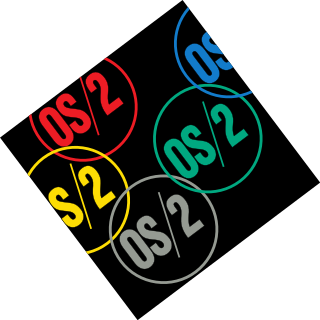
OS/2 is a series of computer operating systems, initially created by Microsoft and IBM under the leadership of IBM software designer Ed Iacobucci. As a result of a feud between the two companies over how to position OS/2 relative to Microsoft's new Windows 3.1 operating environment, the two companies severed the relationship in 1992 and OS/2 development fell to IBM exclusively. The name stands for "Operating System/2", because it was introduced as part of the same generation change release as IBM's "Personal System/2 (PS/2)" line of second-generation personal computers. The first version of OS/2 was initially released in December 1987, and newer versions were released until December 2001.
In computing, cross-platform software is computer software that is designed to work in several computing platforms. Some cross-platform software requires a separate build for each platform, but some can be directly run on any platform without special preparation, being written in an interpreted language or compiled to portable bytecode for which the interpreters or run-time packages are common or standard components of all supported platforms.
Bytecode is a form of instruction set designed for efficient execution by a software interpreter. Unlike human-readable source code, bytecodes are compact numeric codes, constants, and references that encode the result of compiler parsing and performing semantic analysis of things like type, scope, and nesting depths of program objects.
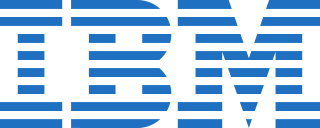
Db2 is a family of data management products, including database servers, developed by IBM. It initially supported the relational model, but was extended to support object–relational features and non-relational structures like JSON and XML. The brand name was originally styled as DB2 until 2017, when it changed to its present form.

The Microsoft Windows Script Host (WSH) is an automation technology for Microsoft Windows operating systems that provides scripting abilities comparable to batch files, but with a wider range of supported features. This tool was first provided on Windows 95 after Build 950a on the installation discs as an optional installation configurable and installable by means of the Control Panel, and then a standard component of Windows 98 and subsequent and Windows NT 4.0 Build 1381 and by means of Service Pack 4. The WSH is also a means of automation for Internet Explorer via the installed WSH engines from IE Version 3.0 onwards; at this time VBScript became means of automation for Microsoft Outlook 97. The WSH is also an optional install provided with a VBScript and JScript engine for Windows CE 3.0 and following and some third-party engines including Rexx and other forms of Basic are also available.

4DOS is a command-line interpreter by JP Software, designed to replace the default command interpreter COMMAND.COM in Microsoft DOS and Windows. It was written by Rex C. Conn and Tom Rawson and first released in 1989. Compared to the default, it has a large number of enhancements.
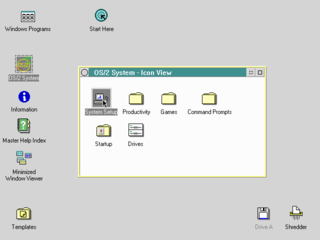
The Workplace Shell (WPS) is an object-oriented desktop shell produced by IBM's Boca Raton development lab for OS/2 2.0. It is based on Common User Access and made a radical shift away from the Program Manager type interface that earlier versions of OS/2 shared with Windows 3.x or the application-oriented WIMP interface of the Apple Macintosh. The Workplace Shell was also used in OS/2 Warp 3 and Warp 4, and the OS/2-based operating systems eComStation and ArcaOS.

In computing, the System Object Model (SOM) is an object-oriented shared library system developed by IBM. DSOM, a distributed version based on CORBA, allowed objects on different computers to communicate.
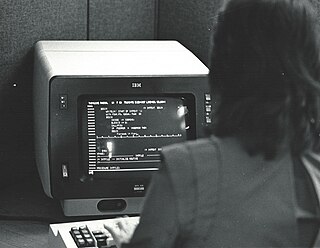
XEDIT is a visual editor for VM/CMS using block mode IBM 3270 terminals.
Take Command Console (TCC), formerly known as 4DOS for Windows NT (4NT), is a command-line interpreter by JP Software, designed as a substitute for the default command interpreter in Microsoft Windows, CMD.EXE.
NetRexx is an open source, originally IBM's, variant of the REXX programming language to run on the Java virtual machine. It supports a classic REXX syntax, with no reserved keywords, along with considerable additions to support object-oriented programming in a manner compatible with Java's object model, yet can be used as both a compiled and an interpreted language, with an option of using only data types native to the JVM or the NetRexx runtime package. The latter offers the standard Rexx data type that combines string processing with unlimited precision decimal arithmetic.
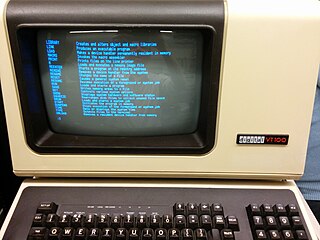
In computing, help is a command in various command line shells such as COMMAND.COM, cmd.exe, Bash, qshell, 4DOS/4NT, Windows PowerShell, Singularity shell, Python, MATLAB and GNU Octave. It provides online information about available commands and the shell environment.
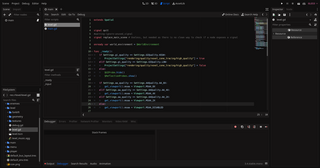
In computing, a script is a relatively short and simple set of instructions that typically automate an otherwise manual process. The act of writing a script is called scripting. Scripting language or script language describes a programming language that it is used for a script.
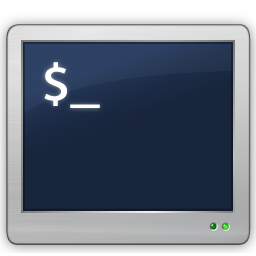
ZOC is a popular computer-based terminal emulator and Telnet software client for the Microsoft Windows and Apple Macintosh macOS operating systems that supports telnet, modem, SSH 1 and 2, ISDN, serial, TAPI, Rlogin and other means of communication. Its terminal emulator supports Xterm emulation with full colors, meta-keys and local printing, VT102, VT220 and several types of ANSI as well as Wyse, TVI, TN3270, and Sun's CDE. It supports full keyboard remapping, scripting in REXX and other languages, and support for named pipes.

SecureCRT is a commercial SSH and Telnet client and terminal emulator by VanDyke Software. Originally a Windows product, VanDyke later added a Mac OS X version in 2010 with release v6.6 and a Linux version in 2011 with release v6.7.

Rexx is a programming language that can be interpreted or compiled. It was developed at IBM by Mike Cowlishaw. It is a structured, high-level programming language designed for ease of learning and reading. Proprietary and open source Rexx interpreters exist for a wide range of computing platforms; compilers exist for IBM mainframe computers.

A command-line interface (CLI) is a means of interacting with a computer program by inputting lines of text called command-lines. Command-line interfaces emerged in the mid-1960s, on computer terminals, as an interactive and more user-friendly alternative to the non-interactive interface available with punched cards.










